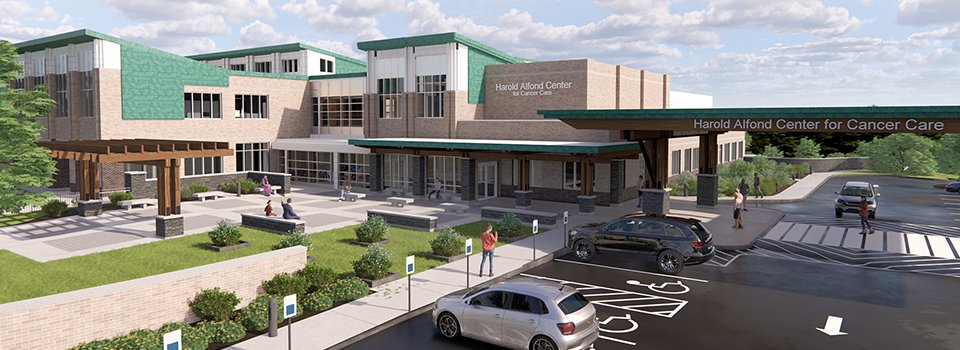Expanding to Meet Growing Cancer Care Needs
Long before a defunct golf course was transformed to include a state-of-the-art cancer center, Deb Bowden recalls the challenges of treating patients at two sites that were much more limited.
“We only had 12 treatment bays in Waterville and five in Augusta, and both locations were very small. Sometimes, a family member couldn’t stay with a patient during treatment because there wasn’t room. Family matters and is a huge part of a patient’s cancer care,” says Bowden, the administrative director of oncology services at MaineGeneral who has worked in the field for more than 38 years as an oncology nurse.
The effort to design, build and open the Harold Alfond Center for Cancer Care (HACCC) in 2007 was the first tangible example of a regionalized approach to health care, centered on the patient, and set in a beautiful setting offering “healing enhanced by nature.”
On its first day, the center treated 64 people, a number that pales in comparison to the 200-plus patients now treated daily. In its 16 years of existence, the HACCC’s patient volume has grown substantially along with the types of cancer it treats and the medical and support services it offers to patients.
Space at the 59,700-square-foot facility has been reconfigured routinely as the program has grown, but it has now run out of room. The time has come for an expansion to meet a much greater need for services and well-position the HACCC for the future.
Treating patients from all parts of Maine
Cancer is the number-one cause of death in Maine and one in three Mainers will be diagnosed with cancer in their lifetime. The HACCC serves 12 percent of the state’s cancer population and patients are referred from all Maine counties, though most live in Kennebec and Somerset counties.
A $36 million project to increase the size and efficiency of the center launched in October 2023 and will be completed in late 2025. Among the goals of the 28,000-square-foot expansion are: enhanced patient privacy, comfort and quality of care; the ability to accommodate more patients and improve patient and family experiences; and greater centralized multidisciplinary care.
These goals will be accomplished through an increase in exam rooms from 15 to 27 and infusion bays from 34 to 44; grouping exam rooms in pods with dedicated clinical offices; creating an integrated Medical Oncology Home/Survivor Clinic; renovating the Radiation Oncology and Genetics & Research spaces; expanding the laboratory and pharmacy spaces; relocating the Open Access Clinic within the center; and providing dedicated space for patient education and support programs. In addition, a new covered entrance to the center will be built, along with a courtyard and new access to the Healing Gardens.
Similar to the initial community-supported capital campaign that helped build the center, a $30 million effort to support the expansion
project was launched in September 2023.
Financial gifts in support of the campaign can be made at give.mainegeneral.org/expand,
or by contacting the MaineGeneral Office of Philanthropy at 207-626-1809 or philanthropy@mainegeneral.org.
Emphasizing the need for growth
The dramatic rise in patients receiving treatment is only one indicator of just how much the HACCC has changed. In 2007, there were three oncologists on staff compared to six now, and one Advanced Practice Provider (APP – a nurse practitioner or physician assistant) on staff; now there are seven APPs working on site and another at the Alfond Center for Health.
Patient services also have increased substantially and include an Open Access Clinic with dedicated providers for unscheduled urgent needs; a cancer genomics program through a partnership with The Jackson Laboratory; disease-specific point-of-entry nurse navigators and clinical nurse navigators to provide support, education and assistance before, during and after the treatment process; a robust clinical trials program; and even such amenities as heat and massage chairs for patients receiving lengthy chemotherapy treatments.
The changing landscape of cancer care
Dr. Rick Polkinghorn started seeing cancer patients full time as an oncology fellow in 1987 and then as a practicing oncologist in 1989. He has practiced at the HACCC since 2012 and also serves as the oncology medical director. The changes he has seen during his career are far-reaching.
“Available treatments back then were really limited. Probably a third of patients received treatment in the hospital and many more needed to be in the hospital afterward because of the toxicities of the treatments,” he says.
“We now can help people much more than we could before and provide treatments more safely, comfortably and effectively,” he adds. “The Harold Alfond Center for Cancer Care is the most recognizable brand of cancer care services in Maine. With six full-time oncologists, we’re providing a lot of treatment to help a lot of people, and we need the expansion to continue doing that.”
And while the center has changed greatly since 2007, Bowden said its focus on providing high-quality care close to home has not.
“We work really hard to put together evidence-based practices, so the treatments and workflow here could mirror those at places like the Mayo Clinic or Dana-Farber,” she says. “You don’t always have to go away for great care, and our center has proven that.”